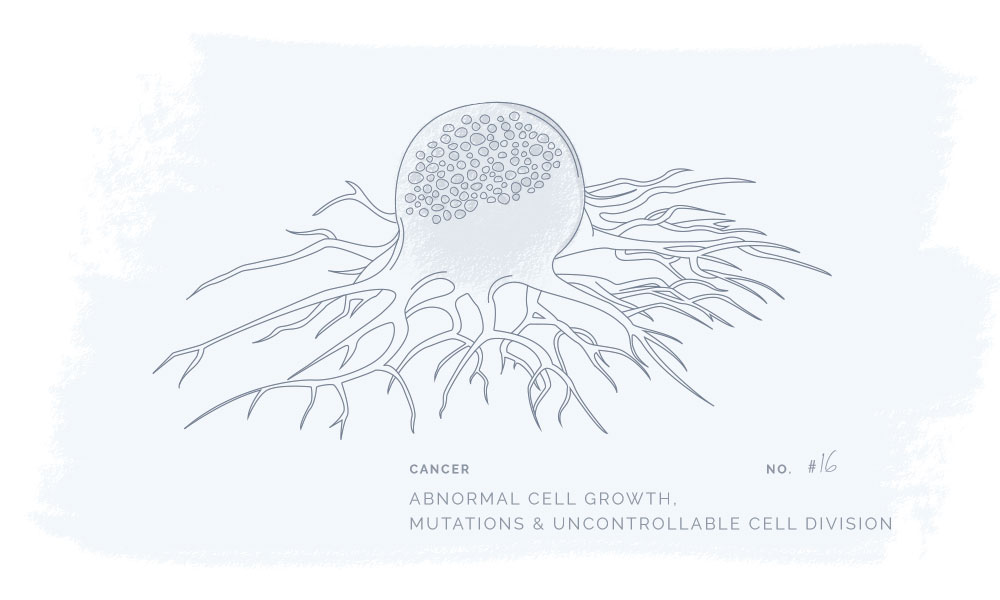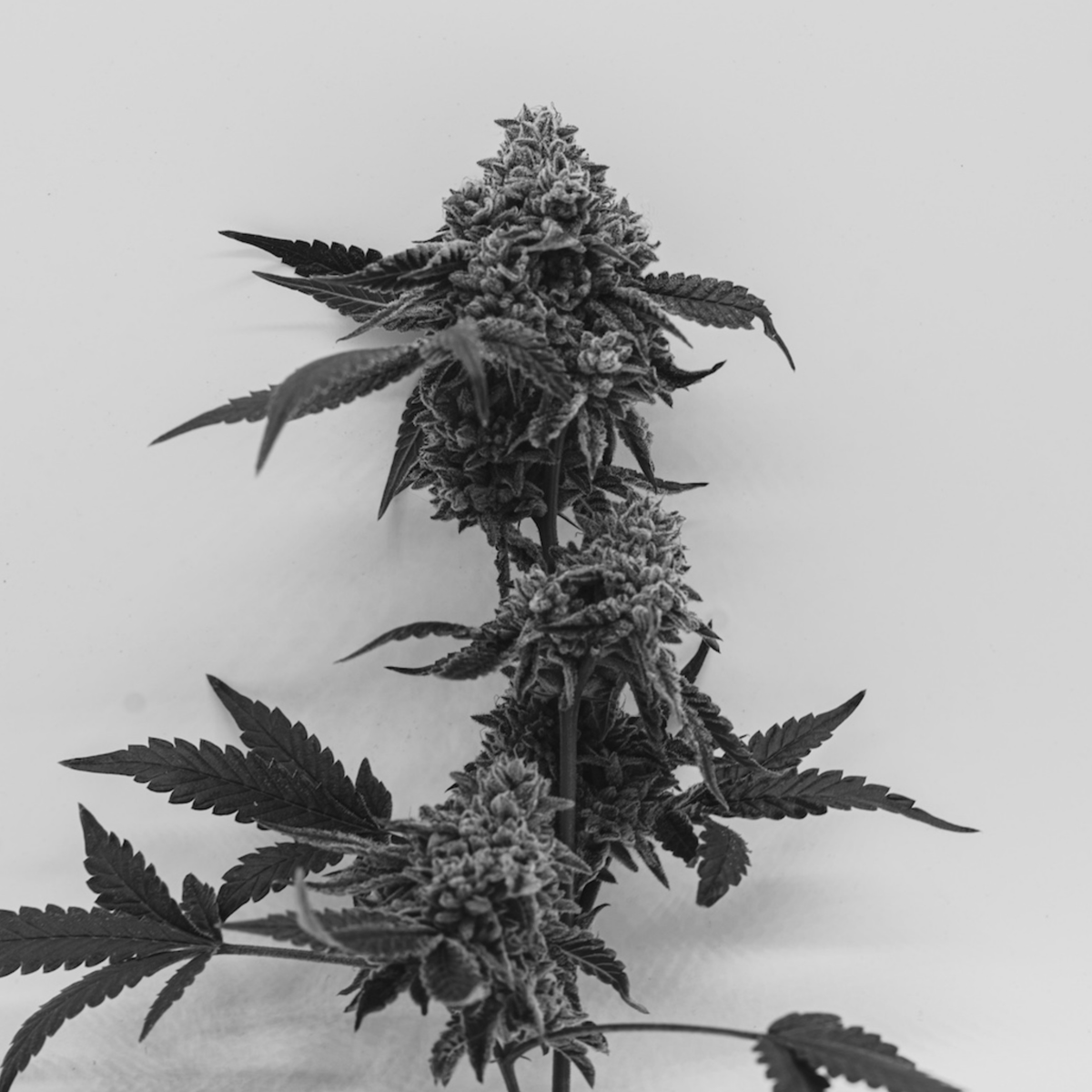
Cancer
Cancer, Genetic Disorders

What is Cancer
Cancer is a group of diseases that involves the growth of abnormal cells which contain mutations leading to uncontrollable cell division and growth. This can take place in any cell type and damage/destroy normal tissue.
For patients, distinct treatments are based on the stage of cancer, the pattern of cell development, and symptoms that differ from patient to patient.
For more detailed information regarding specific cancer diseases and the treatment possibilities with cannabinoids, please stay updated in our newsletter for the upcoming disease review for:
Cancer Symptoms
The symptoms of cancer differ from patient to patient and depend on the type of cancer and level of development.
Therapeutic Potential
Preclinical data suggest CBD and THC among other cannabinoids may be therapeutic in the treatment of Cancer.
Application options
Depending on your needs, the optimal type of application may vary. Find more information on our application options.
The connection between Cannabinoids & Cancer
Studies find that CBD and THC may have great therapeutic potential and may be used to help treat Cancer. CBD and THC are well-known cannabinoids, however, they do not have the same psychoactive effects. THC is psychoactive while CBD does not possess psychoactive effects. According to WHO guidelines, the cannabidiol CBD is generally well tolerated with a good safety profile.
Preclinical evidence proposes that the use of THC and CBD can be beneficial in the treatment of cancer symptoms such as pain and loss of appetite. These symptoms frequently occur with malignant growth of cancer cells or during the treatment of cancer disease.
Furthermore, THC and CBD can help in minimizing the risk of cancer cell division and support cancer cell apoptosis.
In addition, preclinical data suggest that cannabinoids may play a role in diminishing tumors-, cancer cell development- and metastasis besides relieving cancer symptoms and side effects of chemotherapy.

Literature Discussion
The literature discussion is an overview of the published results from scientific studies investigating if and how cannabinoids can be beneficial in the treatment of Cancer. The overview will be updated regularly to ensure the newest and most accurate information.
CBD suppresses cancer progression in animal models
In a review article by Pellati et al., it has been discussed that CBD as a multitarget molecule, functions as an adaptogens , as a modulator, and has antioxidant properties. In animal models, the progression of several cancer types was suppressed by CBD.
CBD and THC triggers apoptosis of cancer cells in combination with radiation therapy
Furthermore, it has been found that an increase of autophagy and apoptosis in cancer cells is triggered by CBD and THC coadministration, followed by radiation therapy.
CBD may play a role in suppressing cell proliferation
CBD was also shown to play a role in suppressing cell proliferation and enhancing apoptosis in different types of cancer models. Studies in rodents have shown that CBD is involved in diminishing reactive gliosis , neuroinflammatory response and plays a role in promoting neurogenesis.
Clinical Trials
Clinical trials are research studies that examine new treatments and evaluate their effects on human health outcomes.
Use of CBD and THC demonstrate pain reduction in cancer patients
In a follow-up study by Johnson et al., the long-term safety and tolerability of THC/CBD spray and THC spray were investigated in 43 patients with cancer-related pain. It was demonstrated that the use of THC/CBD sprays reduced pain in patients with cancer.
THC/CBD spray was found to be generally well-tolerated when using it in a long term. There is no evidence that the long-term use of THC/CBD spray has a loss of effect for the relief of cancer-related pain.
In addition, patients did not attempt to increase this medication dose or other pain-relieving medication over time if they kept using the study medication.
This proposes that the adjuvant use of cannabinoids could play a beneficial role in patients with cancer-related pain.
Cannabinoids & Receptors
Below you find the plant cannabinoids, cannabinoid receptors, and endocannabinoids that are associated with the potential therapy.
CBD
Cannabidiol (CBD) is a dominant cannabinoid in hemp. CBD does not possess psychoactive effects and does not make people high. CBD has been demonstrated to have potential as an alternative for several health-related conditions, including anxiety, pain, depression, among others.
THC
Tetrahydrocannabinol (THC) is a cannabinoid found in the cannabis plant. THC possesses psychoactive properties.
CB2
Cannabinoid receptors are located on the surface of cells in your body and they “listen” to conditions outside the cell. CB2 receptors are key players in the ECS. CB2 receptors are more abundant outside the nervous system, including cells of the immune system.
If you have any further information relevant to the connection between Cancer and cannabinoids or find any of the information inaccurate, outdated or incomplete please contact us here
References
- https://www.mayoclinic.org/diseases-conditions/cancer/symptoms-causes/syc-20370588
- https://www.cancer.org/cancer/cancer-basics/signs-and-symptoms-of-cancer.html
- https://ghmedical.com/endocannabinoid-system/diseases/cancer
- Guindon, J., Hohmann, A., (2011). “The endocannabinoid system and cancer: therapeutic implication”. https://www.ncbi.nlm.nih.gov/pmc/articles/PMC3165955/
- Laezza, C., Et al., (2020). “The Endocannabinoid System: A Target for Cancer Treatment”. https://www.ncbi.nlm.nih.gov/pmc/articles/PMC7037210/
- Pellati, F., Et al., (2018).“Cannabis sativa L. and nonpsychoactive cannabinoids: their chemistry and role against oxidative stress, inflammation, and cancer.” BioMed research international. https://pubmed.ncbi.nlm.nih.gov/30627539/
- Johnson, J. R., Et al., (2013). “An open-label extension study to investigate the long-term safety and tolerability of THC/CBD oromucosal spray and oromucosal THC spray in patients with terminal cancer-related pain refractory to strong opioid analgesics.” Journal of pain and symptom management 46.2 : 207-218″. https://pubmed.ncbi.nlm.nih.gov/23141881/
